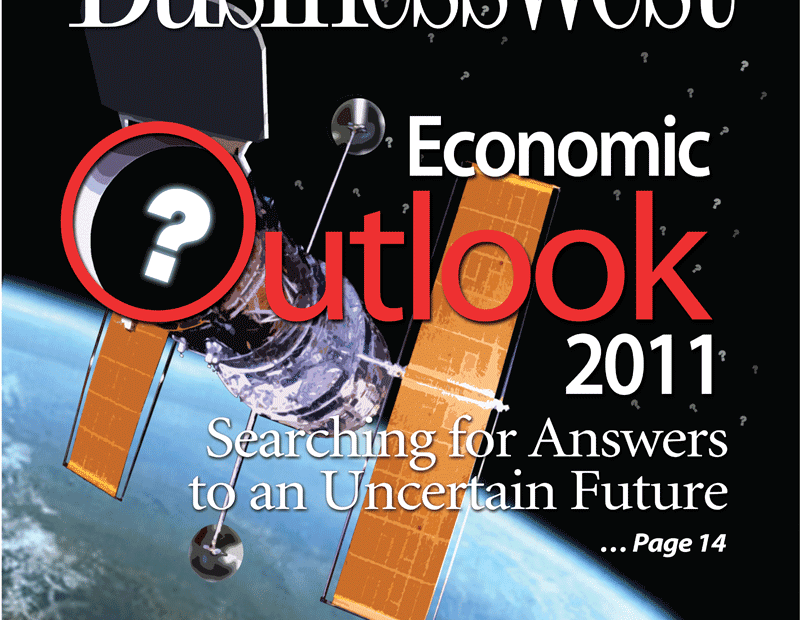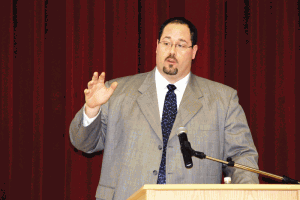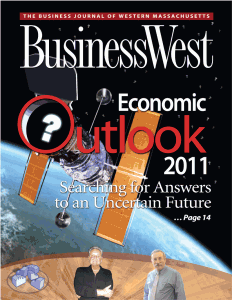
Economic Outlook 2011
Searching for Answers to an Uncertain Future
While uncertainty is the one word most experts are using to frame their opinions about 2011, something approaching consensus is taking shape. It appears the region and nation are due for more slow, unremarkable growth, and probably insignificant gains in terms of employment. In other words, it looks like more of the same that we saw in 2010.Andre Mayer had an intriguing way of summing up what happened with the economy in 2010, one that captured the sentiment of most observers.
“It’s been a year in which conditions have certainly improved … but in a rather disappointing way,” said Mayer, vice president of Communications and Research for the Associated Industries of Mass. (AIM). Indeed, after recording fairly significant growth in the first six months of the year, the economy stumbled, and then seemed to take at least one step backward for every step forward.
“In 2010, we had a pretty good first half in terms of working our way out of a recession,” Mayer continued. “The state economy improved, and business confidence increased, right up until June, and fairly steadily. But then, things began to deteriorate, and some of that has to do with the diminishing impact of stimulus actions on the part of the federal government. We had quite a disappointing third quarter, and while the fourth quarter has been a little better than the third, we’re well behind where we thought we’d be in terms of recovery.”
Karl Petrick, an assistant professor of Economics at Western New England College, agreed.

Karl Petrick says a “Mexican standoff” between consumers and business owners is one of the many issues limiting recovery from the Great Recession.
That report — which showed that just 38,000 jobs were added for the month of November, after robust growth in October, and an unemployment rate of 9.8% — has many economists scratching their heads and shrugging their shoulders when they talk about 2011 and what can be expected regionally and nationally.
But while there is certainly a large amount of uncertainty, there is something approaching consensus when it comes to the outlook on the months and quarters ahead — growth that will be slow and generally unremarkable, with probably only slight improvement in the jobs situation.
This goes double for Western Mass., said Bob Nakosteen, professor of Economics at UMass Amherst, because this region lacks what he calls a “jobs-creating fuel source” like the technology and biosciences clusters in Central and, especially, Eastern Mass., which greatly outperformed the western counties in 2010.
“The problem, of course, is that we really haven’t replaced our declining manufacturing base with anything that has dynamism into the future,” he said, with ‘we’ referring to the Pioneer Valley as a whole, but especially its largest city. “Springfield has not reinvented itself; it has a lot of potential, but isn’t that the worst curse in life, to have a lot of potential?”
“We’re just in for a period of relative stagnation, if that’s the right word,” he continued. “There will be slow growth; I think this may start to improve, but it probably won’t happen before midyear. And it’s only when the national economy starts to improve that we’re going to feel some of the benefits in this part of the state. And there just isn’t enough of an economic engine here to have traction once the national economy starts to grow.”
But Mayer was much more positive in his outlook. “I think 2011 should be a year in which it becomes clear that the recovery is taking hold. We should see improvement from a very low rate of growth as the year goes on, and we’ll enter 2012 in much better posture than we’ll enter 2011.
“Unless we fall off completely,” he continued with a laugh, noting that there is just too much uncertainty — in this area code and countries like Ireland, Portugal, Greece, and others — to say with any degree of confidence what will happen.
For its Economic Outlook 2011, BusinessWest talks with several economists about the immediate future and what will shape it from a recovery standpoint. Overall, they said there are far more questions than hard answers.
Realistic State of Mind
Amid the prevailing disappointment over how 2010 played itself out, there were some bright spots that could prompt optimism if one were so inclined.
Mayer said the state’s performance, which exceeded the nation’s, was one such positive, in part because it showed some depth and diversity in the Commonwealth’s economy, although the good showing likely had more to do with the fact that the Bay State isn’t dominated by the industries hardest hit by the Great Recession, such as home building and automobile manufacturing.
“The fact that we’ve not only been able to keep pace, but actually outperform the nation so far in this slow and halting recovery is a good thing for us,” he explained, adding that, historically, the state has lagged behind the rest of the country when it comes to bouncing back.
Meanwhile, the Commonwealth’s performance helped it retain some talented young people who might otherwise have left for presumably greener pastures.
“We have not seen the kind of outflow of human capital, mostly young people with marketable skills, that we’ve seen after past recessions,” Mayer explained, “because they would leave to seek better job opportunities elsewhere in the country. Right now, there aren’t those kinds of opportunities.
“In fact, the kinds of places where they used to go, the areas with high population growth, like Arizona, Florida, and Nevada, are suffering very badly in this cycle,” he continued, “because those are places where real estate and home construction are very important parts of the economy, and those sectors have just been hammered.”
Overall, the Massachusetts economy — and individual businesses large and small — have “adjusted,” said Mayer, which, roughly translated, means they’ve become more efficient and able to do the same with fewer people, which is another positive from a competitiveness standpoint, but not from a job-growth perspective.
“On balance, companies have been able to adjust to more-difficult circumstances, to a slow-growth economy,” he told BusinessWest. “They’ve been able to keep afloat and in some cases do pretty well, but they’re doing this, in large part, at the expense of job creation; they’ve slimmed down their staffing, and they’re very reluctant to add on new people, so we haven’t seen a whole lot of job creation.”
And, surprisingly, one of the areas where there’s been recorded growth is manufacturing, noted Mayer, adding that this is probably the last sector most observers thought would expand. “Manufacturers can usually squeeze more productivity out of their existing staff, and they’ll usually do that before they add people, so this has been an odd pattern, but something else that bodes well for the state.”
Despite these positive developments, 2010 has been rather forgettable, said Mayer and other observers, and the sluggishness of the past few months, not to mention the November jobs report, makes it that much more difficult to gauge what the year ahead will be like.
“One month you get 172,000 jobs, and the next, 39,000 new jobs, one-fifth the number that was forecast,” said Petrick. “That just really shows how uncertain the recovery remains in terms of when it’s going to gain steam.
“Most forecasters were almost writing 2010 off, saying, ‘we’re going to see some improvement, but not a lot,’ and those people were right,” he continued. “But then, most people were forecasting that things would pick up in 2011; now, some of the more pessimistic forecasts are for 9.5% unemployment nationwide, and the optimistic ones are for 8%, which is significantly higher than it had been, and that doesn’t bode well for Western Mass.”
Petrick noted that perhaps the biggest stumbling block to economic progress, both regionally and nationally, is confidence, or lack thereof. This fear of what is still very much the unknown has both consumers and business owners frozen in their tracks and either unwilling or unable (or both) to step forward with any conviction.
“Consumers are uncertain — they’re holding back as much as they can,” he explained. “Businesses are uncertain, not because they’re worried about taxes, but because they’re worried about what’s happening with consumption. It’s a Mexican standoff between consumers and businesses, each one saying ‘you first.’ Consumers are saying ‘hire us and we’ll spend,’ and businesses are saying ‘spend and we’ll hire you.’”
Stimulating Conversation
Whether there is any relaxing of this standoff in 2011 depends largely on when and to what degree the national economy improves, said Petrick, adding that there are several factors that will play into this.
These include everything from the fate of the announced compromise tax plan to the impact of whatever stimulus funding is still to be spent, to the Federal Reserve’s attempts to actually spur inflation, or at least ward off the more dangerous deflation.
“They are trying to get a higher rate of inflation than we have now, because there are some things that might spring from this that are healthy,” said Nakosteen. “If businesses can get a bit more of a margin in the prices they charge, if low interest rates in the face of a little more inflation prompt investors to get more into the stock market, these are good things, and two outcomes the Fed is trying to get by doing this.
“The risk is that they’re in a little bit of uncharted territory,” he continued, “and it’s not real clear that those actions are actually going to prompt the economy to begin to recover. There are only so many things they can try, and they seem to have tried one of everything; no one really knows.”
Those four words apply to many of the questions concerning the regional and national economy, including the matter of federal stimulus efforts.
Indeed, while many believe the impact of stimulus programs is now mostly in the past tense, Petrick said there remains a substantial amount of stimulus funding that has been allocated for this region but not spent.
“This is construction money, by and large, and it will be helpful, because that’s the sector that’s been the hardest-hit,” he explained. “There still could be a positive effect in the next year from that money that’s been allocated for different projects but hasn’t been spent.”
Locally, progress for the short and long term may well depend on if and to what degree the region can advance the process of reinventing itself.
Petrick sees some signs of progress in the Valley’s ongoing efforts to build its ‘green’ sector.
“This is a region that could, with a lot of work, start to make a name for itself in terms of green technology,” he said. “We have some green shoots — individually, they’re not much, but collectively, this could be a positive thing that could prompt hiring across a number of skill levels.”
But Nakosteen says the region still has a lot of work to do with regard to the process of reinvention.
“We’ve had this long-term decline in our base,” he explained. “There’s nothing really stopping that, and there’s nothing arising to take its place. There’s nothing taking hold to get these gateway cities going, and Springfield is one of those gateway cities.”
The biggest concerns for the year ahead involve jobs and the likelihood that this state and region won’t be creating many.
“We’ve done all right in Massachusetts relative to the rest of the nation,” said Mayer. “October was a pretty good month, maybe the first we’ve had, and then the November report came out, and we went backwards. So it’s very hard to predict what will happen next year.”
U Guessed It
While the past few months have shown that seemingly anything can happen in 2011, economists are in general agreement that the nation and region will likely continue moving along what is the bottom of the U that several referenced when taking about the shape of the recovery.
There may be more movement back up, Petrick told BusinessWest, predicting what amounts to more of the same for at least the next few quarters.
In other words, when 2011 nears its end, you may be seeing and hearing economists say there was improvement, but in a rather disappointing way.
George O’Brien can be reached at
[email protected]





